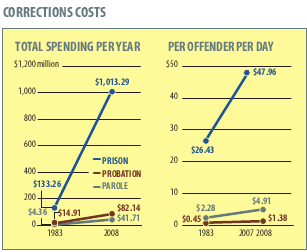 Continuing
Gov. Deal: the good, the ugly, and the bad on prisons,
quoting again from
David Rodock’s interview with Gov. Nathan Deal
in today’s VDT.
Continuing
Gov. Deal: the good, the ugly, and the bad on prisons,
quoting again from
David Rodock’s interview with Gov. Nathan Deal
in today’s VDT.
The Bad
Remember Gov. Deal mentioned poultry operators as an illustration of his bogus point that government intervention is always bad? Well, I guess he forgot that when he answered this question:THE TIMES: Your proposal to have probationers replace illegal immigrants for farm labor. Did that idea work? If it didn’t or it did, what’s going to happen next year during the picking season?Really? Except for little things like not being able to vote if they are felons, and having to pay their probation officers. But back to the Gov.: Continue readingDEAL: “Well, it worked with some success. I think there was a great deal of skepticism about it on whether these people will work and there is a threat associated with their presence. We have to remember that probationers are not under arrest. They are free in our society.


 the like. We know that they work. We know the recidivism rate, if they go
through those approaches rather than directly into the prison system. We
have less recidivism. We break the addictions, and we’ve got to work
very closely on that.”
the like. We know that they work. We know the recidivism rate, if they go
through those approaches rather than directly into the prison system. We
have less recidivism. We break the addictions, and we’ve got to work
very closely on that.”








